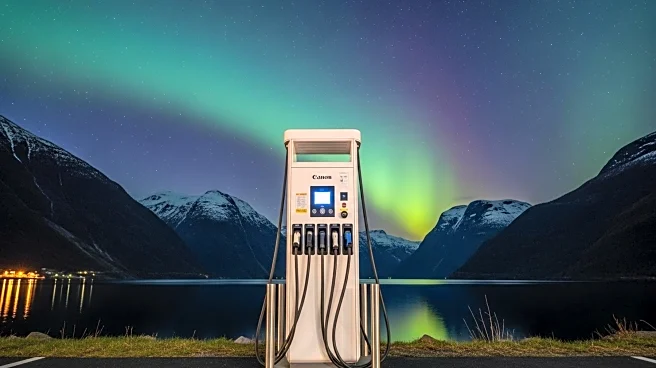What's Happening?
Norway has become a global leader in electric vehicle adoption, with the number of public EV charging ports surpassing the number of fuel nozzles at gas stations. As of the latest count, Norway boasts over 27,500 public EV chargers, compared to approximately 24,000 fuel nozzles across 2,000 gas stations. This shift is supported by Norway's clean energy infrastructure, where over 98% of electricity is generated from hydropower and wind power. The country's aggressive taxation on petrol and diesel vehicles further incentivizes the transition to electric vehicles.
Why It's Important?
Norway's transition to electric vehicles highlights a significant shift in transportation and energy consumption patterns. This move not only reduces reliance on fossil fuels but also sets a precedent for other countries aiming to reduce carbon emissions. The widespread adoption of EVs in Norway demonstrates the feasibility of large-scale clean energy integration, potentially influencing global automotive and energy policies. As Norway leads in sustainable transportation, it challenges traditional automotive markets and encourages innovation in EV technology.
What's Next?
Norway's continued investment in EV infrastructure and clean energy is likely to further solidify its position as a leader in sustainable transportation. Other countries may look to Norway's model as they develop their own strategies for reducing carbon emissions and transitioning to electric vehicles. The success of Norway's approach could accelerate global efforts to adopt renewable energy sources and expand EV infrastructure, potentially influencing international climate policies and automotive industry standards.
Beyond the Headlines
Norway's shift towards electric vehicles raises questions about the future of traditional automotive industries and the role of government incentives in driving sustainable practices. The country's approach may inspire ethical considerations regarding environmental responsibility and the long-term impact of fossil fuel consumption. As Norway continues to innovate, it may also face challenges related to maintaining its clean energy supply and managing the economic implications of reduced fossil fuel demand.











